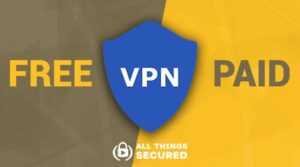Is a using a VPN legal? It’s a legitimate question and the answer is not a simple yes or no. The legal status of VPNs varies by country, making it perfectly legal for you to establish a VPN connection to access the internet in most places. However, there are some cases where the activity you engage in or the country where you connect could make using a VPN illegal due to reasons such as censorship, surveillance, or national security. Here’s how you can know for sure.
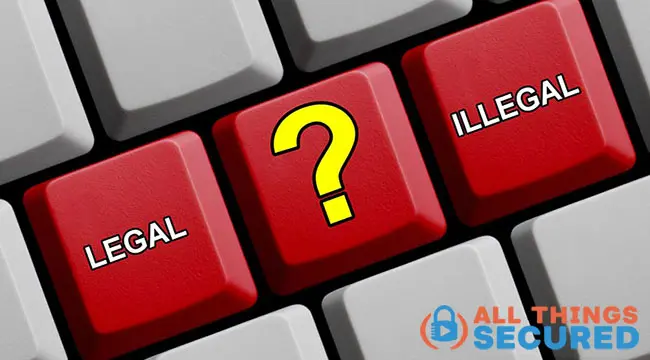
It’s crazy to consider that over the past couple years, a number of countries have begun passing laws banning Virtual Private Networks (VPNs).
China has even started fining its citizens who are caught using the anti-censorship software. It makes sense why many people question whether VPNs are legal in China…or any country for that matter.
Add to that the idea that this security software is specifically designed to mask your Internet activity and are developed by companies strategically located beyond the jurisdiction of any major superpower and, well…
…you can see why this is an issue.
The question isn’t about the integrity of the encryption services; the question is this: in what cases is a VPN illegal to use?
Here’s what we’re going to cover:
Let’s jump right in!
Note: Some of the links in this article are affiliate links, which means that at no extra cost to you, I might be compensated if you choose to use one of the services listed.
What is a VPN and How Does it Work?
To start, we need a bit of context. What exactly is a VPN and why is it even a question whether or not it’s legal?
Definition of a VPN
A Virtual Private Network (VPN) is a technology that creates a secure and encrypted connection between your device and a VPN server.
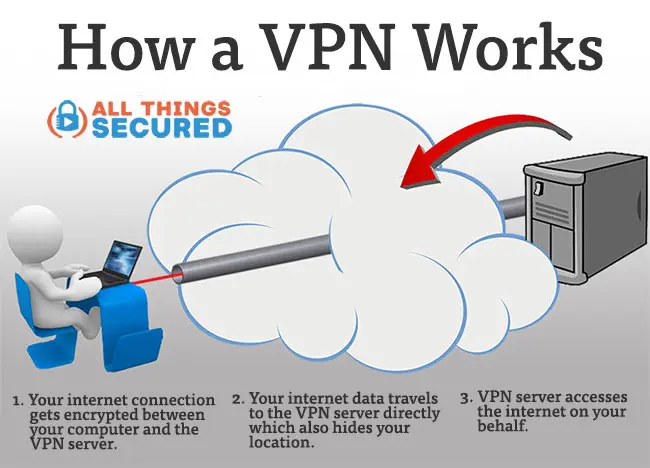
This connection allows you to browse the internet privately and securely, protecting your online activity from prying eyes. Essentially, a VPN acts as a tunnel for your internet traffic, shielding it from hackers, government surveillance, and even your internet service provider.
By using a VPN, you can bypass internet censorship, access geo-restricted content, and maintain your online privacy.
How VPNs Encrypt Internet Traffic
When you connect to a VPN server, your internet traffic is encrypted using advanced encryption protocols such as AES-256. Think of it as scrambling your data into an unreadable format that only the VPN server can decode.
This encryption ensures that your online activity remains private and secure, even when you’re using public Wi-Fi networks, which are notorious for being vulnerable to cyber threats. By encrypting your internet traffic, a VPN makes it nearly impossible for anyone to intercept and read your data, providing you with a secure browsing experience.
Benefits of Using a VPN Service
Using a VPN service provides numerous benefits, including:
- Ability to Hide Your IP Address and Location: By routing your traffic through a VPN server, you can appear to be browsing from a different location, enhancing your anonymity online.The Dark Side of the VPN World
- Enhanced Online Privacy and Security: A VPN masks your IP address and encrypts your internet traffic, making it difficult for anyone to track your online activities.
- Ability to Bypass Internet Censorship and Access Geo-Restricted Content: Whether you want to watch Netflix in China or access websites blocked in your region, a VPN can help you bypass these restrictions.
- Protection from Cyber Threats and Malware: Many VPN services offer additional security features like malware protection and ad-blocking, safeguarding you from online threats.
- Secure Browsing on Public Wi-Fi Networks: Public Wi-Fi is convenient but often insecure. A VPN encrypts your connection, protecting your data from potential hackers.
Those are the benefits…so why would something like that be illegal in some parts of the world?
The Dark Side of the VPN Providers World
Of course, having all these abilities at your fingertips comes with the risk of abusing the legal powers afforded you by using it. Not to mention all the data that you’re giving to these VPN companies
Under the terms and conditions of all major services, you can usually find a list of activities that are prohibited while connected to the network
Among the numerous prohibited items, what sticks out most is:
- Distributing internet viruses: Hiding yourself while trying to infect other networks with a virus is an obvious no-no. Please don’t do that. It is illegal.
- Gaining illegal access to other computers or networks: Again, a bit obvious, but it needs to be stated.
- IP spoofing: The act of pretending to be another machine for the express purpose of gaining illegal access to a computer or network.
- Copyright, Trademark, and Patent Infringement: In other words, torrenting content you would have to pay for under normal circumstances. Even if your service provider allows peer-to-peer and torrent traffic, it does not mean they allow illegally downloading copyrighted content (although most companies don’t actively monitor this). This is the reason that answering the simple question “Is torrenting legal” can be so tricky.
You should also keep in mind that you are never safe torrenting copyrighted content, even if there are some VPNs that are optimized for torrenting
Some virtual private networks even log your activity to crack down on illegal practices. This is true even if they say “We have a no-logging policy,” because, you know…
…VPN companies sometimes lie to you
Using a VPN illegally can lead to severe consequences, including the loss of internet connection, hefty fines, and even imprisonment. It’s crucial to be aware of the laws in your country regarding VPN use to avoid these penalties.
But my VPN says they don’t log data…right?!
While many providers claim they do not log user data, you can never guarantee this is the case.
Every company claims to not log any data, but 95% of the time this isn’t true.
Even if service providers truly do not log user activity, it is possible that the 3rd party companies they rent servers from do, and they can use your data to land you in trouble with the police.
Therefore you always run the risk of bringing the law down upon you when downloading copyrighted material, which is illegal. Selecting a trustworthy VPN provider, especially one with transparent logging policies, is crucial in mitigating these risks.
Which Countries Ban VPNs?
Apart from criminal activity, vpn bans and internet censorship laws are among the reasons why VPNs are considered illegal in some countries, further clouding whether a VPN is legal or illegal.
The following map shows which countries explicitly label the software as “illegal”.
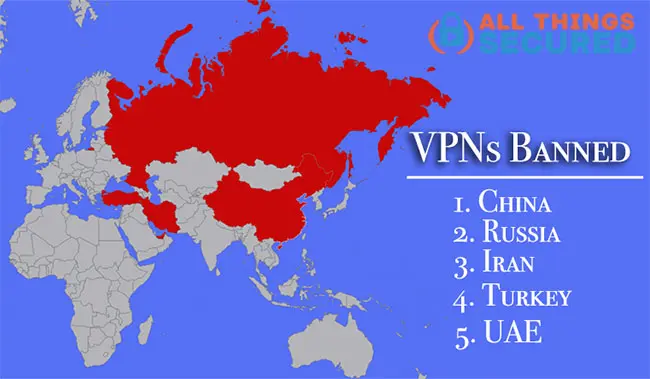
VVirtual Private Networks have been banned and are no longer legal in:
- Iran
- Russia
- China
- Turkey
- United Arab Emirates
In these regions, VPNs illegal status is enforced through strict regulations and monitoring, highlighting the legal risks associated with their use.
As a number of these countries (such as Russia) have only recently made the software illegal, it is still too early to gauge how strict these bans will be.
Moreover, as many corporations and media networks rely on virtual private networks to do business in some of these countries (a legal usage), it is highly unlikely that they will be entirely eliminated. Foreigners are usually fine to use VPNs; it’s the local citizens who have to worry. However, that doesn’t mean that citizens and residents in these countries will not be affected. In China, for example, the Great Firewall uses deep packet inspection (DPI) to detect and block the use of this software. This makes it challenging to access restricted content, especially for local citizens.
Foreigners are usually fine to use VPNs; it’s the local citizens who have to worry. However, that doesn’t mean that citizens and residents in these countries will not be affected. In China, for example, the Great Firewall uses deep packet inspection (DPI) to detect and block the use of this software.
However, that doesn’t mean that citizens and residents in these countries will not be affected. In China, for example, the Great Firewall uses deep packet inspection (DPI) to detect and block the use of this software.
I’ve used NordVPN for years in China despite it being “frowned upon,” and I’m not the only one.
The vast majority of long-term expats in China and all throughout southeast Asia use a virtual private network to access the internet.
The only problem I’ve run into occurred in China’s far western province of Xinjiang. Here, the government went so far as to block cell phone usage for residents caught trying to bypass censorship.
Does this mean you should avoid using a virtual private network in countries where it is blocked?
Generally speaking, campaigns to restrict usage in countries like China are geared towards local citizens and domestic services. Governments may try to block access to VPN servers by blacklisting known VPN IP addresses, creating a constant challenge for VPN providers.
Therefore, foreigners can usually connect to offshore servers and only have to worry about the occasional connection disruption.
For locals, on the other hand, using this software can be considered an illegal anti-government act and has in the past resulted in a fine or, in the worst cases, jail time.
If you want to dig in further, check out these articles:
China’s VPN Restrictions
China is well-known for its stringent internet censorship laws, collectively referred to as the Great Firewall of China. China restricts access to numerous websites and online services, including popular platforms like Google, Facebook, and Twitter.

Only government-approved VPN providers are allowed to operate within the country, making it challenging for users to find reliable VPN services that can bypass these restrictions.
Using a VPN in China can be complex, and it’s essential to choose a VPN provider with a proven track record of operating in the country. Many expats and travelers rely on VPNs to access the unrestricted internet, but it’s crucial to stay informed about the latest regulations and potential risks. Always ensure that your chosen VPN provider has robust security features and a clear no-logging policy to protect your online privacy.
Note: The content provided is a general overview of VPNs and their benefits. It’s essential to research and understand the specific VPN laws and regulations in your country before using a VPN service.
VPNs Aren’t Illegal BUT…Your VPN Usage Can Be
To sum up, choosing a trustworthy VPN service is crucial for legality and enhancing internet privacy. It is not only legal but also highly recommended that you use a VPN to maintain Internet privacy and enhance security. Authorities and internet service providers (ISPs) have been known to monitor vpn traffic to detect and block VPN usage, highlighting the importance of using VPNs capable of obfuscating their traffic.
Only by using your virtual private network for activities that are clearly illegal do you run the risk of getting in trouble with the law. As you’ll see in the infographic linked here, VPNs are an excellent way to maintain online security.
Based on years of personal experience, I use and recommend NordVPN (get 3 months free using this link). It’s an excellent option that is reliable even in those countries where connecting can often be difficult.
The only other thing to consider is whether you’re in a country that technically bans their use. If you are a foreigner in that country, you can generally use a VPN without any concerns.
Local citizens, however, should think twice and review how local laws can affect them if caught using a virtual private network.
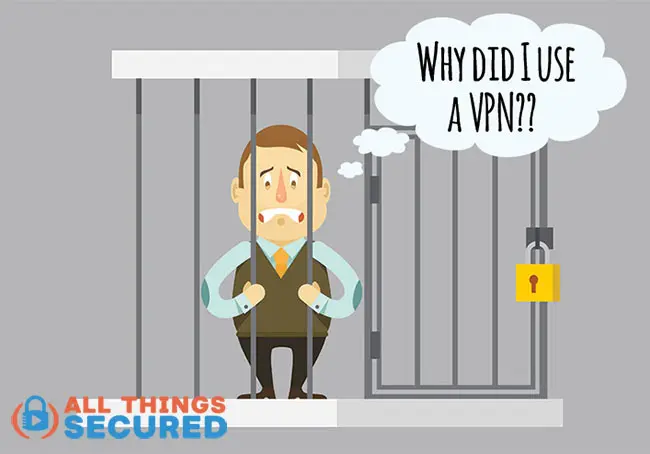
Ha! Just kidding 😉
Illegal vs “Against Terms of Use”
The most confusing aspect about this legal question has to do with the distinction between governmental law and a company’s terms of use, especially when it comes to vpn use. While vpn use in itself is not illegal in many countries, it’s important to understand the legality and restrictions surrounding its use in different jurisdictions.
What exactly do I mean here?
Well, let’s say that you’re using the software to unlock certain geographic perks or find better pricing on a certain good or service. Is this illegal?
The short answer is…
…no.
When we use the term “illegal”, generally we’re referring to actions which go against a societal law. Gaining advantages with streaming or getting better pricing on an online game does not break any country law. However, vpn users should be aware of the potential consequences they face when violating terms of use, not just laws. This could range from account suspension to fines, depending on the severity of the violation and the policies of the vpn providers. Additionally, some countries impose VPN blocks, making it difficult for citizens to access certain content and posing risks for those attempting to bypass these restrictions.
It MIGHT, however, be against the terms of use for that particular streaming service, game or online software. Vpn providers play a crucial role in enforcing these terms of use or cooperating with authorities in cases of illegal activities, ensuring that their services are not used for unlawful purposes.
What this means is that, while you may never have the police knocking on your door, there is a possibility that your favorite game will block your account if they find out that you’re using a VPN to get better pricing.
It’s not ideal, of course, but it’s also not the same as jail time.
Are VPNs Legal? [Video Explanation]
To close the loop here, take a couple minutes to watch this video which offers a quick overview on the topic of whether or not it is illegal.
Be sure to subscribe to the All Things Secured YouTube channel!


